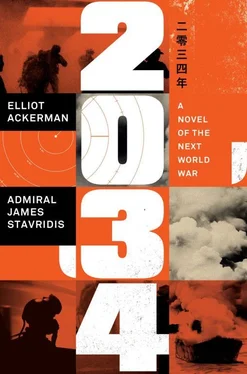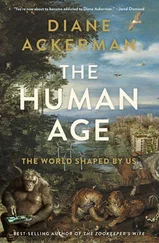Before Chowdhury could ask a question of his boss, the five minutes were up.
The door shut. Both he and Hendrickson stood out front of Wisecarver’s office with a stack of binders in their hands. “Did you know ahead of time about the speech?” Chowdhury asked.
“Does it matter?”
Chowdhury wasn’t certain that it did matter. He also thought this was Hendrickson’s way of telling him that, yes, in fact he had known about the changes. He’d been the senior official from Defense in the room, so it made sense that he would have known. It also made sense that this knowledge would’ve stayed within a tight circle, one that excluded much of the cabinet and nearly all of the White House staff. Nevertheless, it felt like a deception to Chowdhury. Which is to say, it didn’t feel right. But then again, he thought, how else should a decision authorizing such a use of force feel?
“There’s no way we’ll follow through with it,” said Chowdhury. But as he said this, he wasn’t certain whether he was asking a question or making a statement. Although Chowdhury had been kept in the dark about the president’s plan to draw a nuclear red line, he’d been kept in the dark about little else. For instance, he knew the latest disposition of Chinese forces near Taiwan; the noose they had drawn around the island was a combination of their navy, their land- and air-based missiles, along with a contingent of their special forces that could conduct a limited invasion. To stealthily execute this high-speed encirclement, they had used an impressive and still-mysterious combination of technologies. China’s naval forces now hugged the Taiwanese coast, and given the danger of collateral damage, what, if anything, could an American tactical nuclear strike target?
“They’ve just got to believe we’ll do it,” said Hendrickson. “Right now, three of our carrier strike groups have orders in hand to transit the South China Sea. We need time. If we can get those ships on station, we can threaten the Chinese mainland. Then they’ll have to pull resources away from Taiwan. A credible nuclear threat buys us time.”
“It’s also risky as hell.”
Hendrickson shrugged; he didn’t disagree. He began to gather his things, locking the binders and folders in a classified courier bag. He needed to return to the Pentagon. Chowdhury offered to walk out with him. He’d likely spend all night at the office and so wanted to get some fresh air. “I saw your friend Hunt got command of the Enterprise Strike Group,” mentioned Chowdhury in an effort at small talk. The two stood outside the West Wing, a few steps from the last Secret Service checkpoint. Above them the sky was clear and thick with stars.
“Yeah,” said Hendrickson, who was looking away from Chowdhury, across the street toward Lafayette Park. “I saw that too.”
“Well,” said Chowdhury, “good for her.” He was smiling.
“Is it good for her?” asked Hendrickson. He didn’t return Chowdhury’s smile. He only stood there, alternating his gaze between the park and the clear night sky. It was as if he couldn’t quite bring himself to take either a step forward or one backward. “If we do launch—because the Taiwanese cave, or because the Chinese misstep, or because Wisecarver gets his way—it’s most likely Sarah who will have to pull the trigger.”
This hadn’t occurred to Chowdhury.
When Hendrickson tried to step out onto Pennsylvania Avenue, the Secret Service held him back a moment. The Metro Police were responding to an incident inside Lafayette Park, where an old man with a tattered beard was screaming frantically about the “End of Days.” He had emerged only a few minutes before from a small, dirty plastic tent. With a smart phone clutched in his hand, he was listening to a streaming news channel, the volume turned all the way up. Chowdhury recognized the man as he scrambled past. He was part of the so-called “White House Peace Vigil,” which had protested continually against all war, but particularly nuclear war, since 1981. As the police descended upon the man, he grew more frenzied, tearing at his clothes and hurling himself at the gates of the White House. While Chowdhury waited for the Metro Police to make their arrest, he heard one of the Secret Service agents on the other side of the gates mutter, “Old loon…”
The next morning, when Chowdhury opened the news on his tablet’s browser, he clicked on a brief story in the metro section dedicated to the incident. The old man had been released without bail but charged, nevertheless, with a single count of disturbing the peace.
Chowdhury closed the browser; he placed his tablet on the table.
To read another word felt futile.

12:38 June 11, 2034 (GMT-7)
Marine Corps Air Station Miramar
They hadn’t quite figured out what to do with Wedge. His orders from Quantico read only assigned, third marine airwing with no specific squadron mentioned. What was worse was that when he checked into Wing Headquarters and they pulled up his ratings log, the file had been corrupted. They had no record of him being qualified on the F-35, the latest entry being three years old, before he’d transitioned out of the F/A-18 Hornet. It made little difference to the Marine Corps’ bureaucracy that this discrepancy in Wedge’s record was likely the result of yet another Chinese cyber hack. The Marine Corps couldn’t put a pilot into the cockpit of a hundred-million-dollar aircraft if that pilot had no record of ever having flown it. That Wedge had been taken down in Iranian airspace piloting an F-35 and that the details of that incident had been widely publicized didn’t matter. If it wasn’t in his flight log, it hadn’t happened.
This was why, in the weeks after the president’s address, with the specter of a nuclear exchange on the near horizon, Major Chris “Wedge” Mitchell, a fourth-generation fighter pilot, found himself spending most of each day in the deserted officers’ club trying to beat the high score on Galaga , the vintage arcade game . The console sat in the back, leaning against the wall between a chewed-out dartboard and the bullet-riddled tail section of a Japanese Zero, a trophy from another war. Wedge loved the game’s controls. They were so simple. A stick. A button. That was it. The idea behind the game was equally simple: a lone starship holds off a swarm of invaders. The weapons held by the invader and defender are an equal match. The only advantage the starship had was the skill of its human pilot. The game had been in the Miramar officers’ club for decades—since the early 1980s, Wedge guessed. How many hundreds of pilots had played? Guys who’d come home from Vietnam, who had flown in the Gulf War, in Bosnia, Iraq, Afghanistan, and Syria, even in the liberation of Venezuela—they had all touched these controls, striving for that high score. This little red joystick, it was like a holy relic, like the Sword in the Stone. Or at least this was how Wedge allowed himself to think over the quiet mornings and restless afternoons spent in the empty officers’ club.
Every pilot was deployed or getting ready to deploy. Every staffer was working long hours. Which was why Wedge was surprised when a lieutenant colonel wandered into the club one afternoon. Wedge didn’t notice him at first. His concentration was fixed on Galaga . That morning he’d come within a few hundred points of the impossibly high score before his concentration had lapsed. He’d broken for lunch and one fruitless meeting at Wing Headquarters about fixing his orders. He then returned to Galaga , from which he would take only the occasional break to pour over the newspapers for the latest developments in what was beginning to appear like a stalemate around Taiwan.
Читать дальше













